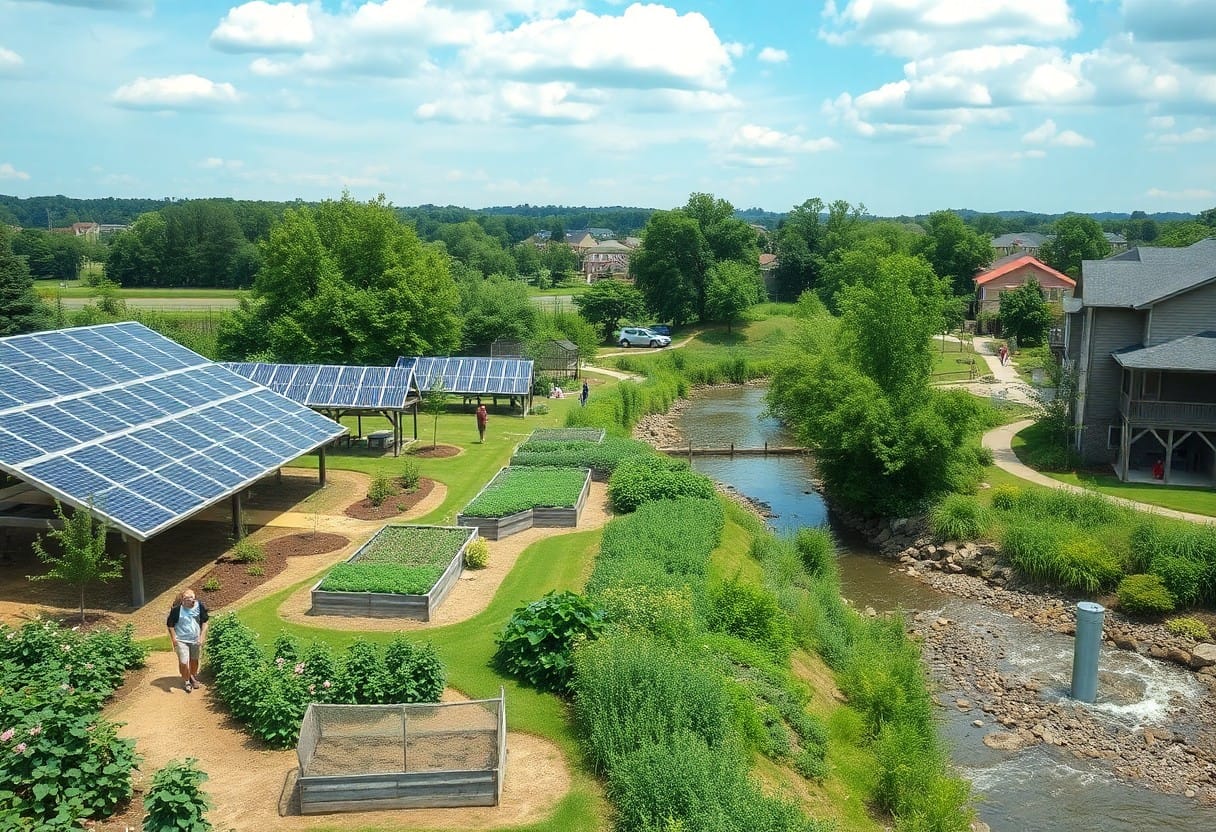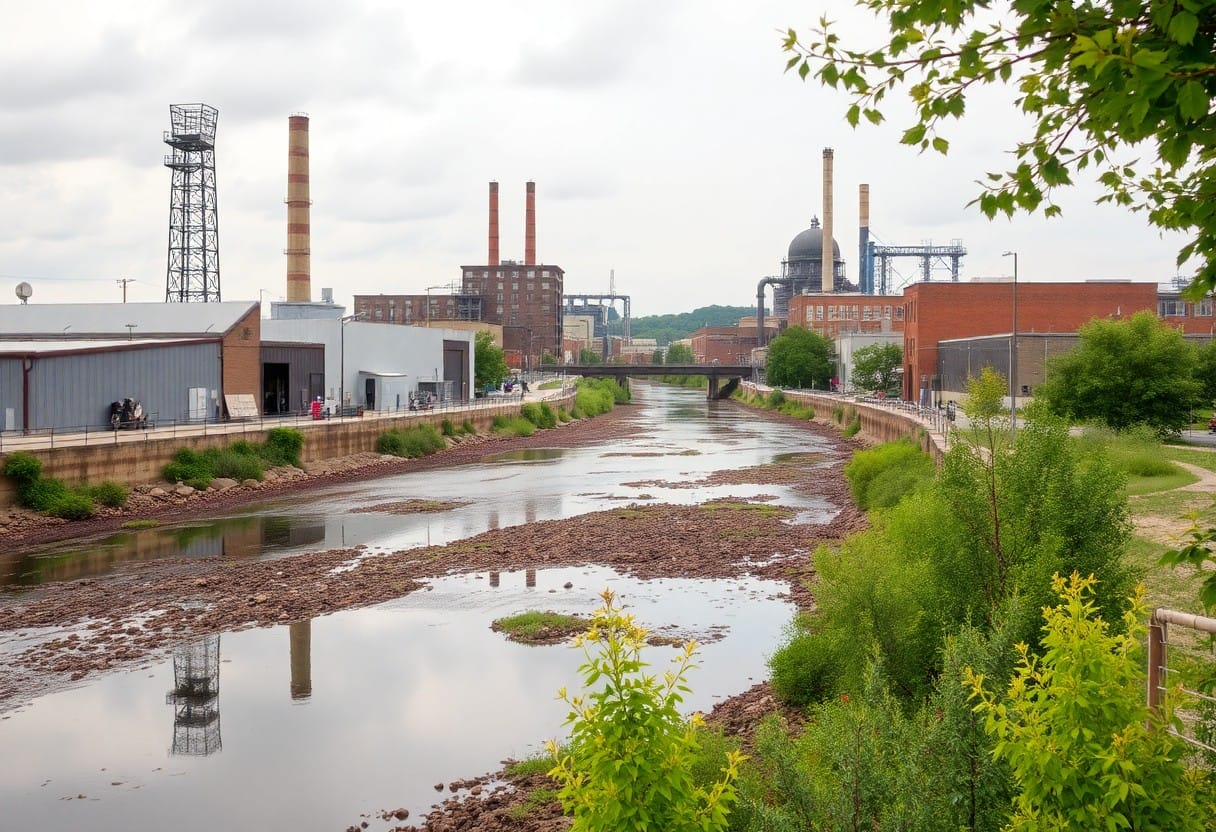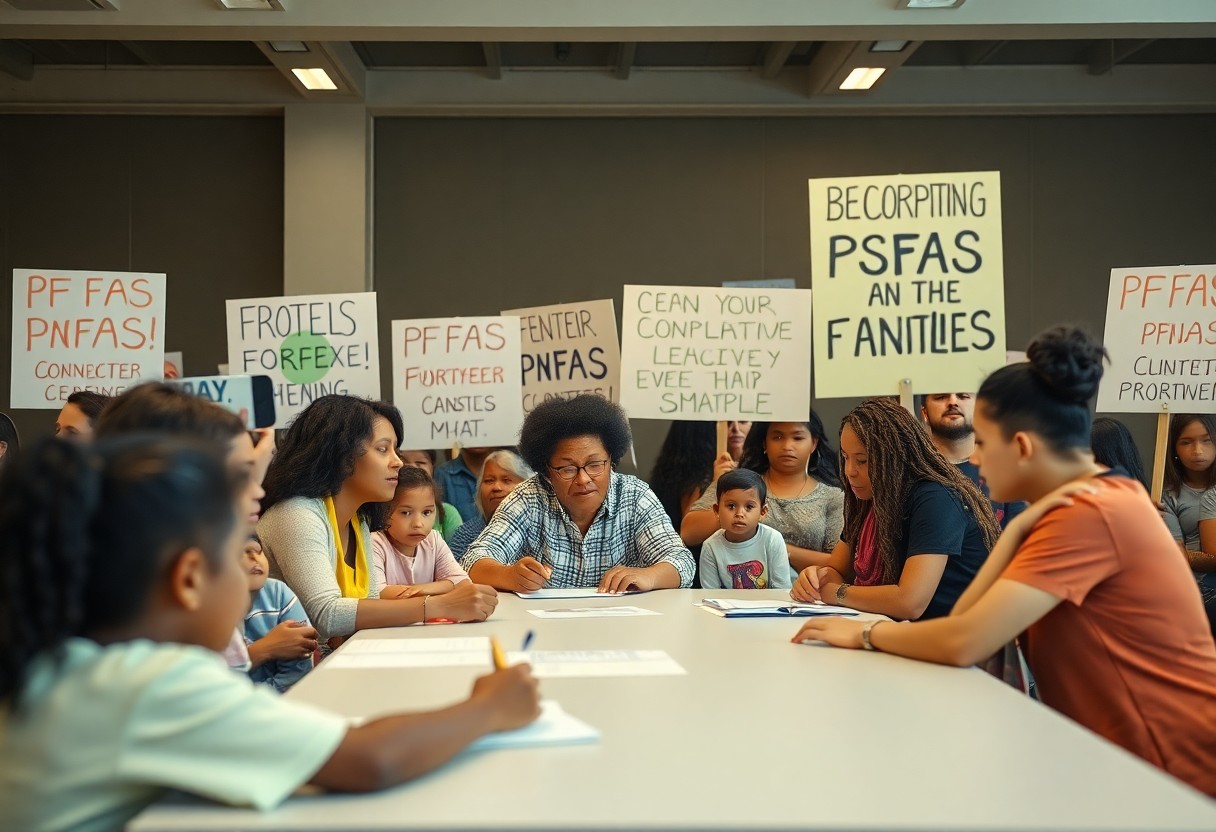With the ongoing challenges resulting from the Chemours crisis, it’s vital for you to understand the sustainable solutions available for Fayetteville. As environmental concerns grow, your community can implement practices that not only mitigate pollution but also foster long-term resilience. Exploring options such as improved waste management, renewable energy initiatives, and community-driven restoration projects will empower you to lead in building a healthier future for Fayetteville. By focusing on these sustainable strategies, you can contribute to the revitalization of your local environment and strengthen community ties.
Overview of the Chemours Crisis
The Chemours crisis refers to the environmental contamination caused by the chemical manufacturing company Chemours in Fayetteville, North Carolina. This situation emerged from the production and release of per- and polyfluoroalkyl substances (PFAS) into the local water supply, which have been linked to numerous health issues. The problem escalated as research revealed that these substances were not only hazardous but also widely persistent in the environment, leading to heightened concern among residents about long-term exposure and potential health risks. You should be aware that this contamination has drawn national attention, prompting legal actions and community activism aimed at seeking accountability and remediation from Chemours.
Background of the Contamination
To understand the background of the Chemours crisis, it’s important to recognize the company’s role in producing chemicals for various applications, including nonstick cookware and firefighting foam. Over the years, Chemours released PFAS into nearby land and waterways, which ultimately infiltrated the drinking water supply. Local residents began to notice unusual health problems and environmental changes, prompting investigations into the extent of the contamination. Through subsequent studies, findings indicated alarming levels of PFAS in both the municipal water system and private wells, leaving residents increasingly concerned about the safety of their drinking water and overall public health.
Impact on the Community and Environment
By examining the impact on the community and environment, it becomes clear that the Chemours crisis has had widespread implications. Residents reported serious health issues, including cancers and reproductive problems, which many linked to their exposure to toxic chemicals. In addition to health effects, the local ecosystem was adversely affected; fish populations declined, and soil contamination posed risks to agricultural activities. Your community faced significant challenges as both the physical environment and public confidence in local water sources deteriorated, demanding urgent action from government entities and Chemours itself.
Considering the scope of the Chemours crisis, it is evident that your community has suffered greatly from the environmental hazards associated with PFAS contamination. Immediate responses included increased water testing and the provision of alternative water sources, which highlighted the severity of the issue. Moreover, local advocacy groups emerged, pushing for stricter regulations and more transparent communication from Chemours about their operations. This grassroots activism not only reflects your community’s resilience but also underscores the necessity for sustainable solutions to ensure the long-term health of both residents and the environment.
Assessing Environmental Damage
If you are a resident of Fayetteville, understanding the impact of the Chemours crisis on your environment is vital. The release of harmful chemicals, particularly PFAS, has raised pressing concerns about the safety of your local water sources and overall ecosystem. As community members, it is vital that you assess the long-term implications this disaster may have on public health and the natural resources available to you and your neighbors.
Water Sources and Quality
With the contamination of local water supplies being one of the most immediate concerns following the Chemours crisis, you need to be aware of the potential risks associated with drinking, washing, or even recreating in tainted water. Tests have shown elevated levels of PFAS in several water sources, which can adversely affect your health over time. Ensuring that your water is safe for consumption and usage requires vigilance, including advocating for regular testing and transparency from local authorities.
Soil and Biodiversity Impact
Around Fayetteville, the soil has also felt the repercussions of the Chemours chemical spills. Contaminated soil can lead to detrimental effects on plant growth, which, in turn, affects the wider ecosystem encompassing local wildlife and agricultural activities. You may notice changes in flora and fauna in your area, prompting a need for immediate action to monitor and mitigate these impacts.
Considering the ramifications on both local biodiversity and soil health, it becomes imperative that you stay informed about ongoing assessments and restoration efforts in your community. The spread of pollutants can shift ecological balances, threatening the survival of native species and diminishing the richness of our natural landscapes. Your engagement in conservation initiatives and discussions about soil remediation practices can foster a more resilient ecosystem that benefits everyone in Fayetteville.
Community Response and Advocacy
Any crisis has the potential to galvanize a community, and the situation in Fayetteville following the Chemours crisis is no exception. You may have noticed a surge in community advocacy and awareness efforts aimed at addressing the fallout from the contamination of local water sources with harmful substances, commonly referred to as Forever chemicals, forever concerns: Cape Fear River and …. Local residents are increasingly mobilizing to demand accountability and transparency from industrial operators, as well as seeking sustainable solutions that prioritize the wellbeing of their environment and community. Public forums, educational workshops, and collaborative initiatives are driving increased engagement and activism, demonstrating that community resilience can flourish even in the wake of adversity.
Local Organizations and Initiatives
Alongside grassroots efforts, a variety of local organizations are stepping up to advocate for clean water and sustainable practices. Groups such as the Cape Fear River Watch and Clean Cape Fear play a pivotal role in raising awareness and impacting policy reform related to water quality in your area. You might find that these organizations engage in actions that include organizing community clean-up events, conducting educational programs concerning the impact of PFAS, and lobbying for stricter environmental regulations. Their commitment not only fosters a sense of collective responsibility but also empowers you and your neighbors to actively participate in the stewardship of your shared resources.
Public Health Awareness Campaigns
Campaigns to enhance public health awareness regarding the dangers of PFAS contamination are increasingly prevalent in Fayetteville. By disseminating reliable information about potential health risks and providing clarity on safe water consumption, you’ll find that these campaigns are integral in educating the public on how to navigate this pressing issue. Community leaders are partnering with health organizations to provide resources that help you understand the implications of these “forever chemicals,” as well as how to protect yourself and your family.
For instance, health awareness initiatives may include workshops that explain the health effects associated with PFAS exposure and suggest practical steps for minimizing risks, such as using filters or exploring alternative water sources. These efforts are vital not only for your immediate safety but also for empowering you to engage in advocacy for long-term solutions. By participating in these campaigns, you help foster an informed community that can collectively advocate for environmental justice and improved public health measures.
Sustainable Remediation Strategies
Many communities affected by industrial contamination, like Fayetteville, have begun exploring sustainable remediation strategies to restore their environments. These initiatives aim to not only clean up existing pollution but also to create a healthier ecosystem for future generations. Through innovative methods, such as phytoremediation and advanced water filtration systems, you can contribute to transforming your local landscape into a safer and more sustainable environment.
Phytoremediation Techniques
An effective approach to addressing soil contamination involves phytoremediation techniques. This method leverages the natural abilities of plants to absorb, degrade, or stabilize contaminants present in the soil and groundwater. By strategically selecting native plant species that thrive in your area, you can promote a flourishing ecosystem while simultaneously tackling pollution. These plants not only clean up harmful substances but also enhance biodiversity and improve soil structure.
Additionally, phytoremediation is often more cost-effective and environmentally-friendly than traditional remediation methods. It minimizes the need for harsh chemicals and extensive excavation, allowing you to restore your community naturally. While the process may take longer than more invasive techniques, the long-term benefits are profound—improving air quality, reducing erosion, and fostering a sense of community stewardship. Engaging in this biological approach empowers you to connect more deeply with your local environment.
Advanced Water Filtration Systems
Beside phytoremediation, advanced water filtration systems play a significant role in providing clean and safe drinking water for communities affected by chemical contamination. These systems utilize cutting-edge technologies, including activated carbon filters, reverse osmosis, and nanofiltration techniques, to remove a wide range of contaminants from water supplies. As you consider options for ensuring safe water in Fayetteville, advanced filtration can be an effective and sustainable solution.
| Enhanced Safety | Efficiently removes harmful substances, including heavy metals and chemicals. |
| Cost-Effectiveness | Reduces the long-term expenses related to waterborne illnesses and contamination cleanup. |
| Environmentally Friendly | Requires less energy and reduces waste compared to other treatment methods. |
Consequently, taking action to implement advanced water filtration systems can yield significant health benefits and ensure access to safe drinking water in Fayetteville. By understanding the importance of these systems and their role in sustainable remediation, you take an active stance in advocating for your community’s well-being. Not only does this technology improve safety, but it also enhances the overall quality of life. You can foster a sense of responsibility in your community by promoting awareness about the necessity of safe drinking water.
| System Type | Evaluate various filtration technologies based on your specific needs and contamination levels. |
| Maintenance Requirements | Consider the upkeep of the system to ensure its long-term efficacy. |
| Cost | Make sure to balance initial investment with long-term savings on health and treatment costs. |
Policy Recommendations
For Fayetteville to move forward sustainably after the Chemours crisis, it is imperative to implement robust policy recommendations that address the underlying issues revealed by this environmental incident. These policies should focus on enhancing regulatory frameworks, fostering community engagement, and ensuring long-term accountability. By doing so, you can not only safeguard community well-being but also restore public trust in local governance and industry practices.
Regulatory Framework Enhancements
At the forefront of your action plan should be the enhancement of the existing regulatory framework. Reviewing and updating local environmental regulations to incorporate stricter monitoring and reporting requirements will prove necessary. You should advocate for the adoption of more transparent standards for emissions and effluents to hold companies accountable while providing you with the assurance that your environment is being protected. Establishing penalties for non-compliance could serve as a deterrent for future violations and encourage corporations to adopt cleaner technologies.
Community Engagement and Transparency
Across all levels of policy implementation, fostering community engagement and ensuring transparency are vital. You should prioritize establishing forums where residents can voice their concerns and participate in decision-making processes. Implementing initiatives that provide clear, accessible information regarding environmental issues and your community’s health will not only keep you informed but will also build a sense of collective responsibility and activism.
Plus, effective communication channels between government agencies, local businesses, and residents are necessary to maintain trust and foster collaboration. By engaging local stakeholders in the environmental oversight process, you can create a sense of ownership in your community’s future. It is important to ensure that you receive updates on pollution levels and are informed of actions being taken to rectify past mistakes. Your voice matters, and an informed community is empowered to advocate for their health and environment effectively.

Future Sustainable Development
After the Chemours crisis, it is important for Fayetteville to adopt sustainable practices that ensure the community’s health and environmental integrity. You may have followed the heartbreaking stories from residents advocating for clean water in Cumberland County, as highlighted in this ‘It’s terrible’: Fight for clean water in Cumberland County …. This calls for a concerted effort toward rebuilding trust and resilience through innovative and sustainable development strategies.
Green Infrastructure Initiatives
Sustainable development can significantly benefit from green infrastructure initiatives. You might consider how urban green spaces, such as parks and green roofs, can contribute to effective stormwater management and improved air quality. Implementing these initiatives not only enhances your community’s aesthetic appeal but also plays a critical role in mitigating the impacts of environmental pollutants. By prioritizing native plantings and sustainable landscaping, you can create habitats that support local biodiversity while effectively absorbing excess water and reducing runoff.
Economic Opportunities in Sustainability
Before you can fully embrace sustainability, understanding the economic implications is vital. Investing in sustainable technologies and practices can open up new job opportunities and stimulate local businesses. For instance, you might explore avenues in renewable energy projects, recycling programs, or eco-friendly construction practices. These ventures not only support the local economy but also position Fayetteville as a leader in the transition to a sustainable future.
Plus, engaging in sustainable development can enhance your community’s resilience and independence. By focusing on green job creation, you could see an influx of sustainable industries, which can meet the growing demand for eco-friendly products and services. This means not only potential financial gains for your local economy but also a cleaner environment for everyone. Transitioning to sustainability will enable you to reap long-term benefits while ensuring that future generations inherit a healthy and vibrant Fayetteville.
Summing up
Ultimately, navigating the aftermath of the Chemours crisis in Fayetteville requires your active participation in pursuing sustainable solutions. By advocating for stricter regulations, supporting local initiatives aimed at environmental restoration, and engaging in community discussions, you play a vital role in shaping a healthier future for the region. Your involvement can drive awareness and influence policymakers to prioritize eco-friendly practices, ensuring that industries are held accountable for their environmental impact.
As you consider the long-term sustainability of Fayetteville, it’s important to stay informed about available resources and programs designed to mitigate pollution and promote regeneration. Exploring renewable energy options, supporting local agriculture, and participating in conservation efforts can create a positive ripple effect in your community. By committing to these sustainable practices, you not only contribute to the recovery from the Chemours crisis but also pave the way for a more resilient and eco-conscious Fayetteville.


















